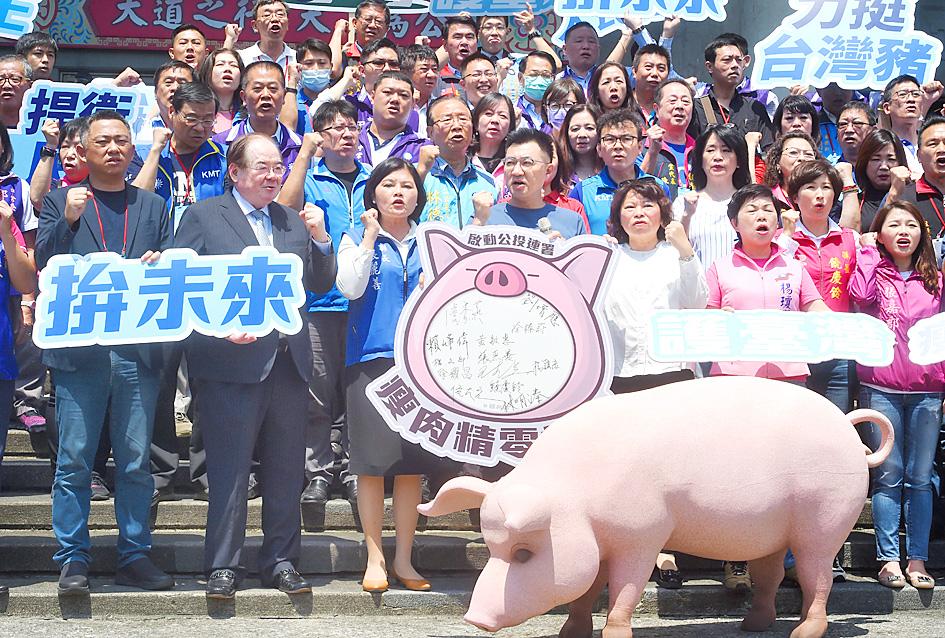The Chinese Nationalist Party (KMT) yesterday said that it would start collecting signatures to initiate a referendum against the government’s decision to allow imports of US pork containing ractopamine.
President Tsai Ing-wen (蔡英文) on Aug. 28 announced that Taiwan would ease restrictions on imports of US pork containing ractopamine and beef from cattle aged 30 months or older, adding that the decision is “based on our national economic interests and consistent with our overall strategic goals for the future.”
The new policies are to take effect on Jan. 1 next year.

Photo: Fang Pin-chao, Taipei Times
KMT Chairman Johnny Chiang (江啟臣) yesterday led dozens of KMT representatives at a news conference outside the Sun Yat-sen Memorial Hall in Taipei during lunch break at the party’s National Congress to announce the launch of the referendum drive.
They chanted slogans including “Safeguard democracy, protect Taiwan,” “Reject leanness enhancing additives,” and “Support Taiwanese pork,” while holding signs bearing similar messages.
Tsai made the decision to allow the importation of US pork and beef without legislative supervision, communication with the public or local governments, or regard for the development of the local industry, Chiang said.
“President Tsai Ing-wen was re-elected with 8.17 million votes,” he said. “She thinks she can do as she pleases.”
“We must call on all people to stand up,” Chiang said, adding: “You [the public] gave her authorization, you can also take back the power.”
The KMT would on Saturday initiate a referendum petition in the nation’s various cities and counties, he said.
The proposed referendum question would read: “Do you agree to a total ban on the importation of pork and related products containing leanness enhancing additives (ractopamine and other beta agonists)?” the KMT said.
Speaking at the news conference, Yunlin County Commissioner Chang Li-shan (張麗善) of the KMT said that there are 1.56 million pigs in the county, or nearly 40 percent of the nation’s total number.
The Democratic Progressive Party (DPP) has said that circumstances have changed when it explained the reason for allowing US pork and beef imports, Chang said.
What has changed is that the DPP used to be the opposition party, but is now the ruling party, she added.
“What is the only thing that has not changed? It is that US pork containing leanness enhancing additives harms bodily health,” she added.
Chang pledged that her county would continue to ban ractopamine even if the central government sets maximum residue limits “to safeguard the health of the public.”
Under the Referendum Act (公民投票法), referendums can be held every two years, with the next possible date being Aug. 28, next year.
To hold a national referendum, a number equal to 1.5 percent of voters in the most recent presidential election must sign a petition supporting the referendum proposal.
There were 19,311,105 eligible voters in the Jan. 11 presidential election, according to Central Election Commission data.
Additional reporting by CNA

The Ministry of Economic Affairs has fined Taobao NT$1.2 million (US$36,912) for advertisements that exceed its approved business scope, requiring the Chinese e-commerce platform to make corrections in the first half of this year or its license may be revoked. Lawmakers have called for stricter enforcement of Chinese e-commerce platforms and measures to prevent China from laundering its goods through Taiwan in response to US President Donald Trump’s heavy tariffs on China. The Legislative Yuan’s Finance Committee met today to discuss policies to prevent China from dumping goods in Taiwan, inviting government agencies to report. Democratic Progressive Party Legislator Kuo Kuo-wen (郭國文) said

The Ministry of Economic Affairs has fined Taobao NT$1.2 million (US$36,900) for advertisements that exceeded its approved business scope and ordered the Chinese e-commerce platform to make corrections in the first half of this year or its license would be revoked. Lawmakers have called for stricter supervision of Chinese e-commerce platforms and more stringent measures to prevent China from laundering its goods through Taiwan as US President Donald Trump’s administration cracks down on origin laundering. The legislature’s Finance Committee yesterday met to discuss policies to prevent China from dumping goods in Taiwan, inviting government agencies to report on the matter. Democratic Progressive Party

Taiwan and its Pacific ally Tuvalu on Tuesday signed two accords aimed at facilitating bilateral cooperation on labor affairs, according to Taiwan’s Ministry of Foreign Affairs (MOFA). The governments inked two agreements in Taipei, witnessed by Foreign Minister Lin Chia-lung (林佳龍) and visiting Deputy Tuvaluan Prime Minister Panapasi Nelesone, MOFA said in a news release. According to MOFA, the agreements will facilitate cooperation on labor issues and allow the two sides to mutually recognize seafarers’ certificates and related training. Taiwan would also continue to collaborate with Tuvalu across various fields to promote economic prosperity as well as the well-being of their

Sung Chien-liang (宋建樑), who led efforts to recall Democratic Progressive Party (DPP) Legislator Lee Kun-cheng (李坤城), was released on bail of NT$80,000 today amid outcry over his decision to wear a Nazi armband to questioning the night before. Sung arrived at the New Taipei District Prosecutors’ Office for questioning in a recall petition forgery case last night wearing a red armband bearing a swastika, carrying a copy of Adolf Hitler’s Mein Kampf and giving a Nazi salute. Sung left the building at 1:15am without the armband and covering the book with his coat. Lee said today that this is a serious